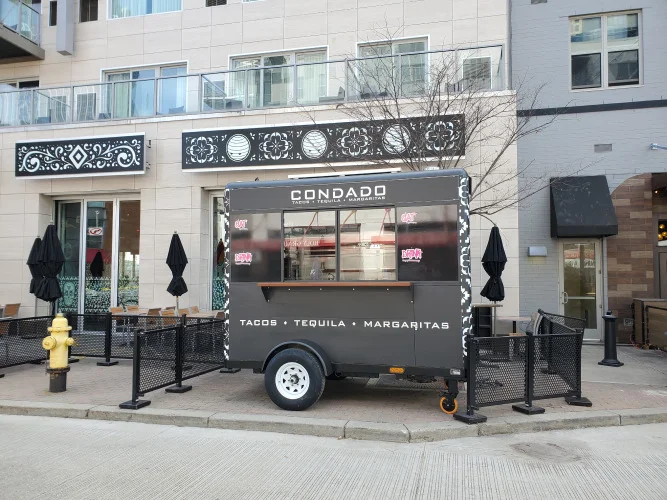Launching a mobile food business has become one of the fastest-growing opportunities in the food and beverage industry. With lower startup costs, flexible locations, and the ability to scale quickly, food trailers are now outperforming traditional brick-and-mortar restaurants.
In this guide, you will learn exactly how to start a mobile food business using a custom trailer, what steps you must follow, costs, permits, equipment, and how a tailor-made Pourter trailer can give you an edge in 2025.
1. Why Choose a Custom Food Trailer Instead of a Food Truck?
Food trailers are becoming the #1 choice for entrepreneurs because they offer:
✔ Lower Startup Cost
You skip the cost of buying a full vehicle. A custom trailer is significantly cheaper than a food truck.
✔ Lower Maintenance
Trailers don’t have engines or transmissions, meaning far fewer repairs and expenses.
✔ More Customization
With a custom trailer, you can design every element:
• kitchen layout
• branding
• equipment setup
• serving windows
• storage
• solar options
• off-grid battery systems
✔ Easy to Move & Park
A trailer can be placed at events, beaches, malls, festivals, and moved easily whenever needed.
2. Steps to Start Your Mobile Food Business (From Idea to Launch)
Step 1: Define Your Food Concept
Choose a concept with high demand and low complexity, such as:
- Coffee & espresso bars
- Smoothies & juices
- Tacos & burgers
- Dessert & sweets
- Shawarma or street food
- Ice cream
- Specialty drinks
Aim for fast service, high margins, and easy operational flow.
Step 2: Create Your Business Plan
Your plan should include:
- Menu selection
- Pricing strategy
- Target audience
- Events & locations
- Startup budget
- Marketing strategy
A custom trailer allows you to design a kitchen that supports your exact menu.
3. How Much Does It Cost to Start?
The total investment for a mobile food business depends on the trailer model you choose and the equipment required for your specific concept. At Pourter, trailer builds start at the following levels:
-
Urban model
Entry level trailer suitable for many food, beverage or coffee concepts.
Starting from 35,000 USD -
Vintage or Classic model
Ideal for a high impact, retro or premium brand presence.
Starting from 45,000 USD -
Premium or Next Gen model
Our all in flagship option that includes graphics design, wrap, marketing support and consulting. This is designed for entrepreneurs who want a fully branded mobile bar, cafe or kitchen with a strong visual identity.
Starting from 59,000 USD
These base prices include the trailer unit itself, electrical setup, plumbing, water system, storage, three compartment sink and a layout designed to pass health inspections. In other words, you receive a complete, compliant shell that is ready for your business specific equipment.
You will then add the equipment that matches your concept, for example espresso machines, refrigeration, cooking appliances and POS systems. On top of that, you should budget for permits and licenses, initial stock, staff, marketing and launch campaigns.
With the right location strategy and a strong concept, many operators recover their initial investment over time by combining low operating costs with high margin food and beverage offerings.
Always check your local regulations because requirements vary by city.
Step 4: Choose & Customize Your Trailer
This is the most important step.
A professional custom build should include:
- Food-grade stainless steel
- Commercial equipment
- Proper ventilation system
- Water tanks and plumbing
- Electrical wiring
- Off-grid battery & solar options
- Branding & exterior design
With Pourter, you can build:
- Bar & beverage trailers
- Coffee trailers
- Urban carts
- Vintage-style trailers
- Fully modular mobile units
Each unit is engineered for efficiency, safety, and high performance.
Step 5: Install the Right Equipment
Your equipment depends on your menu, but usually includes:
- Refrigerators & freezers
- Prep counters
- Espresso machines
- Grills, fryers, or ovens
- POS & cashless payment systems
- Lighting & storage
Make sure your trailer layout supports a fast workflow to prevent customer delays.
Step 6: Select Strategic Locations
Mobile business success depends heavily on traffic.
The best locations include:
- Events & festivals
- Beaches and parks
- Business districts
- Malls and shopping streets
- Stadiums
- Private events & catering
Move wisely, test new spots, and be consistent with top-performing locations.
Step 7: Branding & Marketing
Your mobile trailer must stand out visually and digitally.
Branding Essentials
- Trailer wrap
- Menu design
- Staff uniforms
- Logo and colors
Digital Marketing
- Instagram & TikTok content
- Google Business Profile
- Location-based ads
- Influencer visits
- Customer reviews
80 percent of customers decide based on visuals and reviews before even visiting.
4. Why a Pourter Trailer Gives You a Competitive Advantage
A Pourter custom mobile unit is designed for:
- Ultra-light mobility
- Battery + solar powered operation
- Off-grid performance
- Fast service capability
- Long-term durability
- Smooth workflow
- Low energy consumption
- Precise branding
- Your trailer becomes a complete business in motion — engineered for long-term success.
5. Final Thoughts
Starting a mobile food business is one of the most profitable and flexible opportunities in 2025. With a custom-built trailer, you can launch faster, operate at lower cost, and adapt to any market.
Whether you’re an entrepreneur, a café owner wanting to expand, or someone looking for a scalable business model — a custom trailer is the perfect starting point.
When you’re ready to build your unit, Pourter can guide you through concept creation, design, engineering, and delivery.
